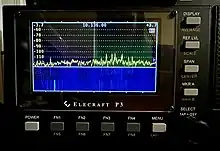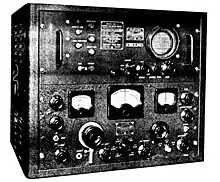Radio spectrum scope
The radio spectrum scope (also radio panoramic receiver, panoramic adapter, pan receiver, pan adapter, panadapter, panoramic radio spectroscope, panoramoscope, panalyzor and band scope) was invented by Marcel Wallace - and measures and shows the magnitude of an input signal versus frequency within one or more radio bands - e.g. shortwave bands.[1][2] A spectrum scope is normally a lot cheaper than a spectrum analyzer, because the aim is not high quality frequency resolution - nor high quality signal strength measurements.

A modern Elecraft P3 Panadapter

RBY-1, US Navy Panoramic Radio Adapter RBY-1 with Hallicrafters SX-28. The Panoramic Radio Adapter is the upper part.
The spectrum scope use can be to:
- find radio channels quickly of known and unknown signals when receiving.
- find radio amateurs activity quickly e.g. with the intent of communicating with them.
Modern spectrum scopes, like the Elecraft P3, also plot signal frequencies and amplitudes over time, in a rolling format called a waterfall plot.
References
- Panoramic radio receiving system US 2279151 A
- The History of Amateur Radio Citat: "...Panoramic reception was created in 1932 by the French engineer and ham Marcel Wallace, F3HM. The Panadaptor is the first spectrum analyzer portraying visually the signals in a selected part of the radio spectrum, making RF signals visible, identifiable my mode...", backup
External links
Wikimedia Commons has media related to Radio spectrum scopes.
- Ham radio Band-scope pan-adapter using Tek MDO4000 as a spectrum analyzer on YouTube
- K9rod.net: Spectrum Scope
- ac8gy.com: Panadapter for FT-950
- k2za.blogspot.dk: FT-817 Tip - Spectrum Scope Archived 2016-03-04 at the Wayback Machine
- portabletubes.co.uk: Panoramic Radio Products PCA-2 Panadapter
- Navy Receiving Panoramic Adaptor (Panadaptor) Info
This article is issued from Wikipedia. The text is licensed under Creative Commons - Attribution - Sharealike. Additional terms may apply for the media files.